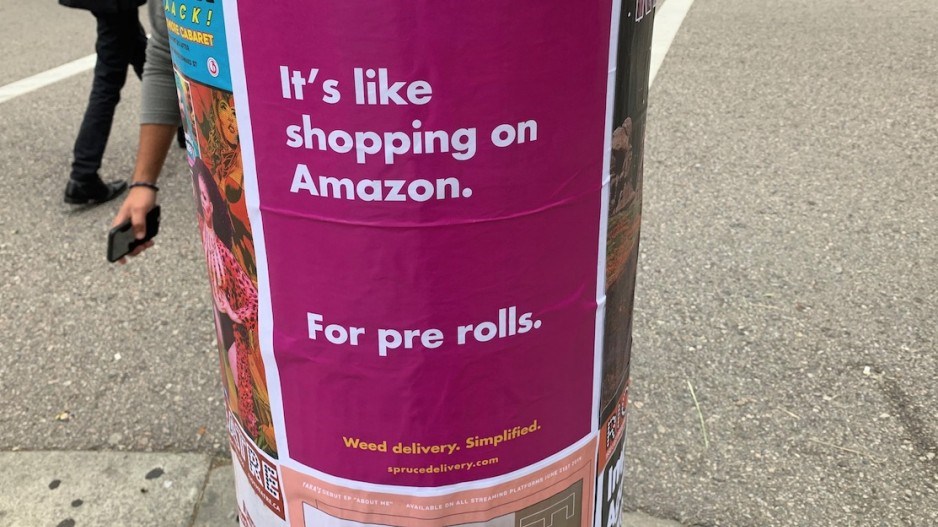What happened: B.C.'s minister in charge of policing, Solicitor General Mike Farnworth, told Business in Vancouver in an exclusive interview that he has spoken with federal officials about shutting down black market sellers of cannabis online.
Why this matters: The federal government's rationale for legalizing cannabis was to keep it out of the hands of minors and to eliminate the black market.
Legal retail stores are slowly starting to open in Vancouver and owners of physical black-market stores are starting to close their operations. Black-market cannabis sales online, however, are flourishing. Only the B.C. government's BCCannabisStores.com website is legally authorized to sell cannabis online in the province.
Yet online cannabis sellers, such as SpruceDelivery.com, for example, are brazen enough to post bright pink posters on downtown Vancouver traffic-light poles, touting their efficiency as being on par with one of the world’s largest online retailers.
“It’s like shopping on Amazon,” a poster at the intersection of Davie and Howe streets recently said. “For pre rolls. Weed delivery. Simplified.”
The delivery section of SpruceDelivery.com’s website explains that the delivery area is downtown, Strathcona, Mount Pleasant and part of Kitsilano. Purchasers are to “meet your bud at the curb,” the site says.
“When you get our text, head outside and meet your buddy. That’s it. Honestly, it’s as easy as ordering a pizza.”
Shoppers must fill out an online form to sign up, and supply their delivery address. They are told that they can use cash or debit.
Solicitor General Mike Farnworth told BIV in an exclusive interview that he is aware of these ventures and he that he has spoken with federal counterparts about it.
“The feds are aware of [black market cannabis e-commerce sales,] and they are illegal, and the feds have indicated from my conversation with them that they will be looking at a number of ways of dealing with this right across the country,” said Farnworth, who is in charge of policing in B.C. but does not get involved in operational decisions. Instead he sets policies and regulations, and is involved with his government peers in changing laws related to how police do their jobs.
The B.C. government is working with the federal government to try to shut down black market cannabis sales online because many of those enterprises accept credit cards, and banking is federal jurisdiction, he added. He declined to say exactly who the federal officials were who he spoke with, or if they were in the RCMP.
“There are a number of ways in which you can deal with [black-market online cannabis sellers,]” he said. “There are sting operations, for example.”
Farnworth has long touted that his ministry will have what it calls a Community Safety Unit (CSU). Dozens of people have been hired and members of the unit are speaking with municipal representatives across the province, including at the City of Vancouver.
Its members are also visiting physical black market stores to explain to owners how to get a legal licence to sell cannabis and that if they do not go through the proper channels, they will be shut down.
The Vancouver Police Department (VPD) has conducted recent busts where they seized large amounts of cannabis and shut down extraction labs. They have not been actively shutting down physical black-market stores. Those stores have been closing in part because of court decisions.
The CSU was not part of the VPD's raids because its focus is to shut down physical black-market stores.
“This has been the elephant in the room since the beginning,” said Groundwork Consulting partner Jamie Shaw.
She stressed that illegal online cannabis sellers proliferated long before Canada legalized cannabis.
“Everybody was freaking out over the bricks-and-mortar stores where everyone knew where they were," she said. "There were just as many online stores where nobody knew where they were.”
@GlenKorstrom




